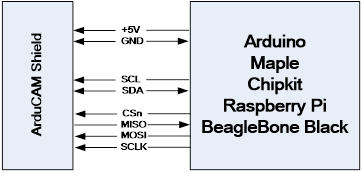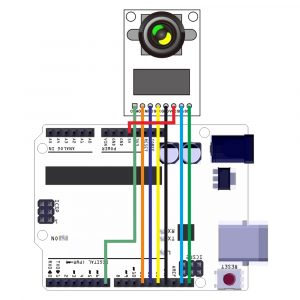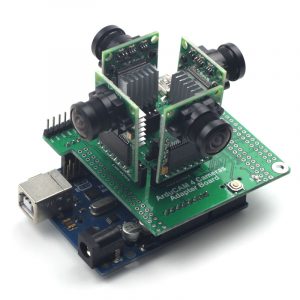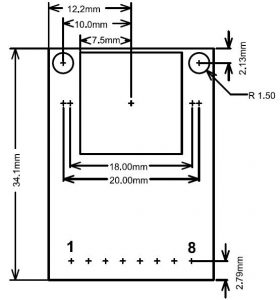Arducam Shield Mini 2MP Plus
1. Introduction
ArduCAM Shield Mini 2MP Plus is the latest version of mini 2mp camera, it is a high-definition 2MP SPI camera, which reduces the complexity of the camera control interface. It integrates 2MP CMOS image sensor OV2640 and provides miniature size, as well as an easy-to-use hardware interface and open source code library. The ArduCAM mini can be used on any platform like Arduino, Raspberry Pi, Maple, Chipkit, Beaglebone black, as long as they have SPI and I2C interface and can be well mated with standard Arduino boards. ArduCAM mini not only offers the capability to add a camera interface that doesn’t have in some low-cost microcontrollers but also provides the capability to add multiple cameras to a single microcontroller.
2. Feature
- 2MP image sensor OV2640
- M12 mount or CS mount lens holder with changeable lens options
- IR sensitive with proper lens combination
- I2C interface for the sensor configuration
- SPI interface for camera commands and data stream
- All IO ports are 5V/3.3V tolerant
- Support JPEG compression mode, single and multiple shoot mode, one-time capture multiple read operation, burst read operation, low power mode and etc.
- Well mated with standard Arduino boards
- Provide open source code library for Arduino, STM32, Chipkit, Raspberry Pi, BeagleBone Black
- Small form of factor
3. Key Specifications
| Power Consumption Normal: 5V/70mA Low power mode: 5V/20mA | Active pixel size: 1600x1200 |
|---|---|
| SPI speed: 8MHz | Lens: 1/4 inch |
| Frame buffer: 8MByte | Resolution support: UXGA, SVGA, VGA, QVGA, CIF, QCIF |
| Format support: YUV, JPEG | Size: 34 x 24 mm |
| Weight: 20g | Temperature: -10℃~+55℃ |
4. Pin Definition
| Pin No. | PIN NAME | TYPE | DESCRIPTION |
|---|---|---|---|
| 1 | CS | Input | SPI slave chip select input |
| 2 | MOSI | Input | SPI master output slave input |
| 3 | MISO | Output | SPI master input slave output |
| 4 | SCLK | Input | SPI serial clock |
| 5 | GND | Ground | Power ground |
| 6 | VCC | POWER | 3.3V ~ 5V Power supply |
| 7 | SDA | Bi-directional | Two-Wire Serial Interface Data I/O |
| 8 | SCL | Input | Two-Wire Serial Interface Clock |
5. Functions
5.1 Single Capture Mode
Single capture mode is the default capture mode of the camera. After issuing a capture command via SPI port, the ArduCAM will wait for a new frame and buffer the one entire image data to the frame buffer, and then assert the completion flag bit in the register. The user only needs to poll the flag bit from the register to check out if the capture is done.
5.2 Multiple Capture Mode
Multiple capture mode is advanced capture mode. By setting the number of frames in the capture register, the ArduCAM will capture consequent frames after issuing the capture command.
5.3 Short Movie Recording Mode
Short movie recording mode is advanced capture mode. By setting the maximum number of frames in the corresponding register, the ArduCAM will capture continuous frames until the 8MByte frame buffer is full.
5.4 JPEG Compression
The JPEG compression function is implemented in the image sensor. With proper register settings to the sensor, the user can get different resolutions with JPEG image stream output.
5.5 Normal Read and Burst Read Operation
Normal read operation reads each image data by sending a read command in one SPI read operation cycle. While burst read operation only needs to send a read command and then read multiple image data in one SPI read operation cycle. It is recommended to use burst read operation to get better throughput performance.
5.6 Rewind Read Operation
Sometimes user wants to read the same frame of image data multiple times for processing, the rewind read operation is designed for this purpose. By resetting the read pointer to the beginning of the image data, the user can read the same image data from the start point again.
5.7 Low Power Mode
Some battery power devices need to save power when in the idle status, the ArduCAM offers the low power mode to reduce power consumption, by shutting down the sensor and memory circuits.
5.8 Image Sensor Control
The image sensor control function is implemented in the image sensor. By setting the proper set of register settings, the user can control the exposure, white balance, brightness, contrast, color saturation and etc.
6. Hardware Wiring
6.1 Single Camera Wiring
The typical connection between ArduCAM shield and Arduino or etc platform is shown in Figure 1. More typically Figure 2 shows the wiring for the Arduino UNO R3 board.
Figure 1 Typical Wiring
Figure 2 Wiring for Arduino UNO R3
6.2 Multi Cameras Wiring
The multi-cameras connection between ArduCAM shield and Arduino or etc platform is shown in Figure 3. More typically Figure 4 shows the multi-cameras wiring for Arduino UNO R3 board.
Figure 3 Multi-Cameras Wiring
Figure 4 Mult-Cameras Wiring on Arduino UNO
7. I2C Interface
The I2C interface is directly connected to the image sensor OV2640. It should be well initialized before the normal operation, or else there is no output from the sensor. The OV2640 I2C slave address is 0x60 for writing and 0x61 for reading. Users can use I2C master to read and write all the registers in the OV2640 sensor. For more information about the OV2640 register, please refer the OV2640 datasheet. Figure 5 shows the writing value 0x01 to the OV2640 register 0xFF. Figure 6 shows the reading value 0x26 from the OV2640 register 0x0A.
Figure 5 I2C Write Bus Timing
Figure 6 I2C Read Bus Timing
8. SPI Slave Interface
The ArduCAM SPI slave interface is fixed SPI mode 0 with POL = 0 and PHA = 1. The maximum speed of SCLK is designed for 8MHz, care should be taken not to overclock the maximum 8MHz. The SPI protocol is designed with a command phase with a variable data phase. The chip select signal should always keep asserted during the SPI read or write bus cycle. For SPI detail timing, please continue to read Arduchip chapter.
9. Lens Options
ArduCAM Shield Mini 2MP Plus camera shield is shipped with default LS-4011 (S mount). There are more lens options that can be found on our lens product page.
There are two lens kits selected for Arducam cameras, please check the LK001 and LK002 for detail.






